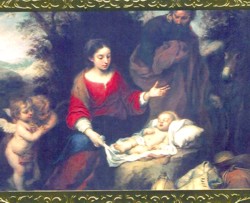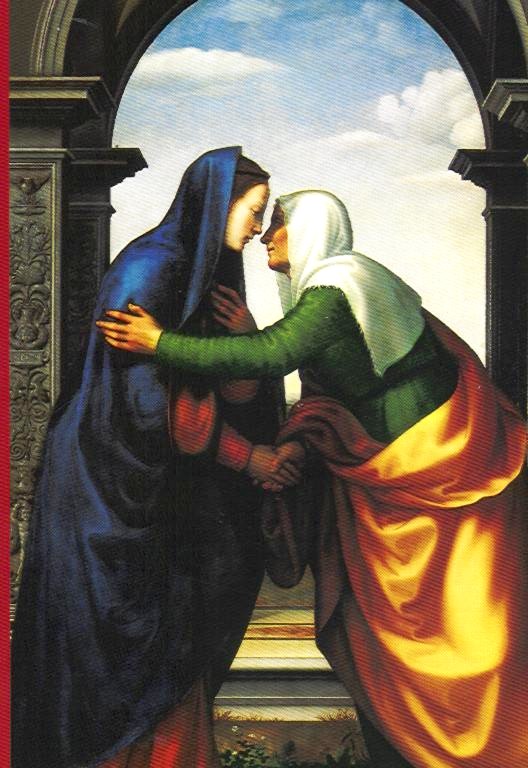There are many devotional phrases that easily come to mind when we think of Mary or pause before an icon of Theotokos or a statue to our Lady, including what should be a daily prayer for all Christians, "be it unto me according to your word". But perhaps it is the opening word of Magnificat that more easily arouse us.
My soul does magnify the Lord and my spirit has rejoiced in God my Saviour for He has regarded the lowliness of His handmaiden.
This wonderful song of rejoicing and of social justice by Mary is chanted unceasingly throughout the world daily, but I wonder how many of those who chant the daily evening office visualise the setting of that canticle: in the countryside near Jerusalem, outside the home of the aged Elizabeth as she greets her young cousin Mary. At Mary's salutation, John Baptist, the last of the prophets and representing the end of the Old Covenant, leaped in his mother's womb for joy to salute the coming of the promised Messiah, the herald of the New and everlasting Covenant. Elizabeth responds to her unborn son's greetings with those welcoming words, "And whence is this to me, that the mother of my Lord should visit me?" prefaced by those immortal words, "Blessed are you among women, and blessed is the fruit of your womb" and "Blessed is she who believes: for there shall be a performance of those things which were told her from the Lord.
The Caroline Divine, Jeremy Taylor in depicting this Visit enables us to visualize it so easily.
When the eternal God meant to stoop so low as to be fixed in our centre, he chose for his mother a holy person and a maid. She received the angel's message with such sublimity of faith that her faith was turned into vision, her hopes into actual possession, and her grace into glory. She who was now full of God, bearing God in her virgin womb, and the Holy Spirit in her heart, arose with haste and gladness to communicate that joy which was designed for all the world; and she found no breast to pour forth the first emanations of her overjoyed heart so fit as her cousin's Elizabeth, for she was to be the mother of the Baptist, who was sent a forerunner to prepare the way of the Lord her son.
 Let us now notice how light and airy was the coming of the Virgin, as she made haste over the mountains; her very little burden which she bear hindered her not but that she might make haste enough; and as her spirit was full of cheerfulness and alacrity, so even her body was made airy and full of life. And there is this excellency in religion that when we carry Christ within us, his presence is neither so peevish as to disturb our health, nor so sad as to discompose our cheerfulness, but he recreates our body by charity and by securing God's providence over us while we are in the pursuit of the heavenly kingdom. For as the Virgin climbed mountains easily, so there is no difficulty in our life so great, but it may be managed by those assistances we receive from the holiest Jesus, when we carry him about us.
Let us now notice how light and airy was the coming of the Virgin, as she made haste over the mountains; her very little burden which she bear hindered her not but that she might make haste enough; and as her spirit was full of cheerfulness and alacrity, so even her body was made airy and full of life. And there is this excellency in religion that when we carry Christ within us, his presence is neither so peevish as to disturb our health, nor so sad as to discompose our cheerfulness, but he recreates our body by charity and by securing God's providence over us while we are in the pursuit of the heavenly kingdom. For as the Virgin climbed mountains easily, so there is no difficulty in our life so great, but it may be managed by those assistances we receive from the holiest Jesus, when we carry him about us.
 It is not easy to imagine what collision of joys was at this blessed meeting; two mothers of two great princes, the one the greatest that was born of woman, and the other his Lord. When these who were made mothers by two miracles came together, they met with joy and mysteriousness. The mother of our Lord went to visit the mother of his servant, and the Holy Ghost made the meeting festival. Never, but in heaven, was there more joy and ecstasy. For these women were not only hallowed, but made pregnant and big with religion, meeting together to compare and unite their joys and their eucharist.
It is not easy to imagine what collision of joys was at this blessed meeting; two mothers of two great princes, the one the greatest that was born of woman, and the other his Lord. When these who were made mothers by two miracles came together, they met with joy and mysteriousness. The mother of our Lord went to visit the mother of his servant, and the Holy Ghost made the meeting festival. Never, but in heaven, was there more joy and ecstasy. For these women were not only hallowed, but made pregnant and big with religion, meeting together to compare and unite their joys and their eucharist.
 By this God would have us know that when the blessings of God descend upon us, they should be published in the communion of the saints, so that the hopes of others may receive increase, that their faith may receive confirmation, that their charity and eucharist may grow up to become excellent and great, and the praises of God be sung aloud, till the sound strike at heaven and join with the alleluias which the morning stars in their orbs pay to their great creator.
By this God would have us know that when the blessings of God descend upon us, they should be published in the communion of the saints, so that the hopes of others may receive increase, that their faith may receive confirmation, that their charity and eucharist may grow up to become excellent and great, and the praises of God be sung aloud, till the sound strike at heaven and join with the alleluias which the morning stars in their orbs pay to their great creator.
 Mary's response to Elizabeth's welcome and expression of faith is of course the Magnificat but it is not addressed to Elizabeth. Rather it is addressed to God. It is this song that Luke puts on the lips of Mary that tells us more about her than anything else she said or did, apart from her reply to the angel Gabriel. In fact the Magnificat is a logical statement after that profound statement of faith, "Be it unto me, according to your word." It is a song of unending praise to God by a young woman who is full of joy for what God has done through her but it is also a prayer of hope for all common people. Just as God has lifted her up, so He will with all the oppressed. So it no wonder in those parts of the world where there is extreme poverty and oppression that Mary is venerated as their "champion" as well as their queen. It is in her ordinariness and lowliness that she is such a powerful and magnetic figure. Just as her Son revealed that in His humility is power, so in Mary her lowliness and championing of the oppressed is an everlasting inspiration to all peoples.
Mary's response to Elizabeth's welcome and expression of faith is of course the Magnificat but it is not addressed to Elizabeth. Rather it is addressed to God. It is this song that Luke puts on the lips of Mary that tells us more about her than anything else she said or did, apart from her reply to the angel Gabriel. In fact the Magnificat is a logical statement after that profound statement of faith, "Be it unto me, according to your word." It is a song of unending praise to God by a young woman who is full of joy for what God has done through her but it is also a prayer of hope for all common people. Just as God has lifted her up, so He will with all the oppressed. So it no wonder in those parts of the world where there is extreme poverty and oppression that Mary is venerated as their "champion" as well as their queen. It is in her ordinariness and lowliness that she is such a powerful and magnetic figure. Just as her Son revealed that in His humility is power, so in Mary her lowliness and championing of the oppressed is an everlasting inspiration to all peoples.
 I rejoice heartily in the Lord,
I rejoice heartily in the Lord,
 in my God is the joy of my soul;
in my God is the joy of my soul;
 for he has clothed me with a robe of salvation,
for he has clothed me with a robe of salvation,
 and wrapped me in a mantle of justice,
and wrapped me in a mantle of justice,
 like a bridegroom adorned with a diadem,
like a bridegroom adorned with a diadem,
 like a bride bedecked with her jewels.
like a bride bedecked with her jewels.
 Nations shall behold your vindication,
Nations shall behold your vindication,
 and all kings your glory;
and all kings your glory;
 you shall be called by a new name
you shall be called by a new name
 pronounced by the mouth of the Lord.
pronounced by the mouth of the Lord.
 You shall be a glorious crown in the hand of the Lord,
You shall be a glorious crown in the hand of the Lord,
 a royal diadem held by your God.
a royal diadem held by your God.
 So we honour you O Highly favoured One, more glorious than the seraphim and cherubim, and Mother of our Saviour. May your faith, obedience and love inspire us to listen to the Holy Spirit, and do whatever He bids us in working with your Son in the process of salvation for all creation. Amen.
So we honour you O Highly favoured One, more glorious than the seraphim and cherubim, and Mother of our Saviour. May your faith, obedience and love inspire us to listen to the Holy Spirit, and do whatever He bids us in working with your Son in the process of salvation for all creation. Amen.
All nature is created by God and God is born of Mary.
God created all things, and Mary gave birth to God.
God who made everything made himself from Mary, and so he refashioned everything he had made.
The One who was able to make all things out of nothing declined to make it by force but first became Mary's son.
As God is the Father of all created things, so Mary is the mother of all re-created things.
God is the Father of all that is established, and Mary is the mother of all that re-established.
For God gave birth to the Son through whom all things were made and Mary gave birth to the Son through whom all are saved.
God brought forth him without whom nothing is,
Mary bore him without whom nothing is good.
O truly, 'the Lord is with thee,' to whom the Lord gave himself, that all nature in thee might be in him.
-Anselm, Prayer to Mary


